Rules
Deal and play are clockwise. The game starts with each player anteing a stake to the pot. Next the players receive three cards each and, in turn, decide to "knock", "pass" or "check". Knocking (either by knocking on the table or saying "I knock") means that a player wants to play for the pot. A player who passes throws in their hand and drops out of the current deal. A player may only check if no other player so far has knocked. It means that the player will decide later whether to knock or pass.
Those who knocked get two more cards each and then play the cards to tricks. Players must head the trick if able. If two equally high cards are played, the second one beats the first. The cards have the same ranking as in a One-Card Kille (Enkortskille), with the difference that the Kille (Harlequin) is always the highest card.
Eldest leads to the first trick, and the winner of each trick leads to the next. The player who wins the fifth and final trick also wins the deal. All the players who knocked but lost must pay as much to the pot as it contained at the end of the deal, and after that the winner collects the entire pot including the payment of the losers.

Brag is an 18th century British card game, and the British national representative of the vying or "bluffing" family of gambling games. It is a descendant of the Elizabethan game of Primero and one of the several ancestors to poker, the modern version just varying in betting style and hand rankings. It has been described as the "longest-standing British representative of the Poker family."

Solo whist is the English form of Wiezen, a simple game of the Boston family played in the Low Countries. It is a trick-taking card game for four players in which players can bid to make eight tricks in trumps with any partner, or a solo contract playing against the other three players. Thus it combines both partnership and cut-throat play. Scoring is with small stakes won or paid out on each hand.

Julepe, , is a gambling card game of Spanish origin, similar to the English five-card Loo, and best for six players. It spread rapidly across the Spanish-American countries during the 19th century.

The following is a glossary of terms used in card games. Besides the terms listed here, there are thousands of common and uncommon slang terms. Terms in this glossary should not be game-specific, but apply to a wide range of card games played with non-proprietary packs. It should not include terms solely related to casino or banking games. For glossaries that relate primarily to one game or family of similar games, see Game-specific glossaries.

Tippen, also known as Dreiblatt, Dreikart, Drei Karten, Dreekort, Kleinpréférence or Labet, is an historical German 3-card, plain-trick game which was popular as a gambling game for three or more players. The Danish version of the game was known as Trekort and more elaborate Swedish variants include Knack and Köpknack. It appears to be related to the English game of Three-Card Loo. It was banned as a gambling game in some places.
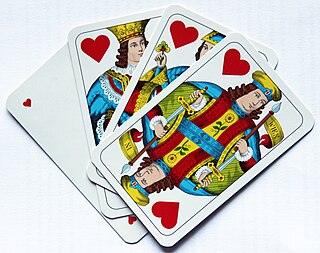
Préférence, frequently spelt Preference, is a Central and Eastern European 10-card plain-trick game with bidding, played by three players with a 32-card Piquet deck, and probably originating in early 19th century Austria, becoming the second most popular game in Vienna by 1980. It also took off in Russia where it was played by the higher echelons of society, the regional variant known as Preferans being still very popular in that country, while other variants are played from Lithuania to Greece.
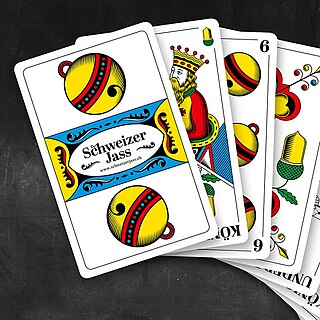
Chratze is a trick taking card game, mainly played in the German-speaking part of Switzerland as well as in Bavaria. It is one of over 70 variants of Jass and played with a pack of 36 cards, either a Swiss-German or French one. It appears to be related to the Austrian game, Kratzen.

Bestia is an Italian card game. It is a gambling game and is similar to Briscola and Tressette. The word bestia means beast.

Bavarian Tarock or, often, just Tarock, is a card game that was once popular in Bavaria and also played in parts of Austria as well as Berlin. The name is a clue to its origin in the historical German game of [Gross-]Tarock, a game using traditional Tarot cards. At some point in the mid- to late-18th century, attempts were made to emulate Taroc using a standard 36-card German-suited pack, resulting in the formerly popular, south German game of German Tarok. During the last century, the variant played with a pot (Haferl) and often known as Bavarian Tarock or Haferltarock, evolved into "quite a fine game" that, however, has less in common with its Tarock progenitor. German Tarok also generated the very similar game of Tapp, played in Württemberg, and both are related to Bauerntarock, Dobbm and the American games of frog and six-bid solo. Bavarian Tarock should not be confused with Königrufen, also known as Austrian Tarock or just Tarock.
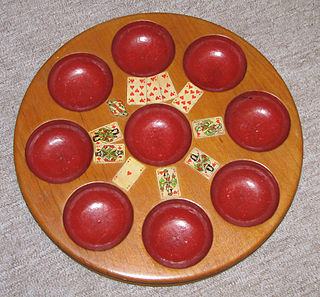
Poch, Pochen or Pochspiel is a very old card game that is considered one of the forerunners of poker, a game that developed in America in the 19th century. An etymological relationship between the game names is also assumed. Games related to Poch are the French Glic and Nain Jaune and the English Pope Joan. Other forerunners of poker and possible relatives of the game are the English game, Brag, from the 16th century and the French Brelan and Belle, Flux et Trente-et-Un. Poch is recorded as early as 1441 in Strasbourg. In north Germany it was called by the Low German name of Puchen or Puchspill, and the board was a Puchbrett.
Lampeln or Lampln is an old Bavarian and Austrian plain-trick card game that is still played in a few places today. It is one of the Rams group of card games characterised by allowing players to drop out of the current game if they think they will be unable to win any tricks or a minimum number of tricks.

Skwitz was a 19th-century Austrian card game of the fishing type for 2 to 8 players that was said to be of English origin. It may be a descendant of Cassino which it resembles.

Norseman's knock or Norrlandsknack is a classic Swedish card game for 3 to 5 players, known since the mid-1800s. It is traditionally played for money. The game is about winning as many tricks as possible and above all not being completely left without a trick.

Knack is a Swedish card game, mainly played for money, in which the aim is to win at least one of the three tricks. It is also known as Trekort or Trikort, although that usually refers to a more basic game of Danish origin that is probably its progenitor.

Svängknack is a Swedish card game for 6 to 8 players that is a further development of Knack and, like the latter, is mainly played for money.

Köpknack is an old Swedish card game which is a development of knack and, like the latter, is mainly played for stakes. The game is also known as trekort which, however, usually refers to a simpler version of Danish origin that may have been its progenitor.
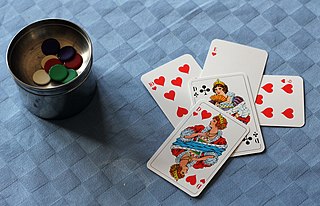
Femkort is a classic Swedish card game for 3 to 8 players "with an unusual object", known since the 17th century, being mentioned in 1658 in Georg Stiernhielm's epic poem, Hercules (Herkules) as Fämkort. It is traditionally played with some kind of bet.
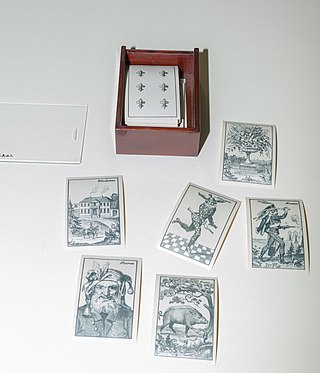
Kille, also called Harlequin, Cambio, Campio, Kambio or Kamfio, is a game played with special playing cards, dating from a mediaeval French gambling game. In Sweden, the game had its heyday during the 1750s, but it is one of the oldest card games still played.

Papillon is an old French card game of the fishing type for three or four players. It has been described as "perfect for children who know how to count".

Zwikken is a Dutch gambling game of the trick-and-trump type using playing cards and designed for three to six players. It is "an old soldiers' game", still popular among the military today.

















